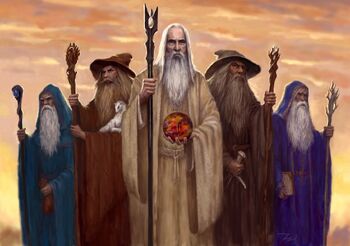Livingston (talk | contribs) m (→History) Tag: Visual edit |
m (→History) Tag: Source edit |
||
| Line 5: | Line 5: | ||
== History == |
== History == |
||
| − | In the [[Undying Lands]] around [[TA 1000]], [[Manwë]] (leader of the Ainur, and King of the Valar and Arda) learned that the dark lord [[Morgoth]]'s most loyal lieutenant, Sauron, was returning to power. He then summoned a council that concluded that the [[Valar]] |
+ | In the [[Undying Lands]] around [[TA 1000]], [[Manwë]] (leader of the Ainur, and King of the Valar and Arda) learned that the dark lord [[Morgoth]]'s most loyal lieutenant, Sauron, was returning to power. He then summoned a council that concluded that the [[Valar]] were to send three messengers to Middle-earth to protect the free peoples and reassure them that the Valar had not forgotten them. Only two Maiar came: [[Curumo]] (aka Curunir, and Saruman) sent by [[Aulë]], and Morinehtar ([[Alatar]]), sent by [[Oromë]]. Manwë summoned [[Olórin]] (Gandalf), and Manwë asked Olórin if he would go as the third messenger. [[Olórin]] claimed he was too weak and that he feared [[Sauron]]. However, [[Manwë]] said that was all the more reason to go, and that he commanded [[Olórin]] to go as the third, whereupon [[Varda]] said, "Not as the third." [[Yavanna]] begged [[Curumo]] to take [[Aiwendil]] (Radagast), and [[Alatar]] took Rómestámo ([[Pallando]]) as a friend. They were forbidden to dominate the free peoples of [[Middle-earth]] or to match Sauron's power with power. |
The Wizards were known by various names and were arrayed in different colors. Of those who came to [[Middle-earth]], sent by the [[Valar]], five are known, the [[Heren Istarion]] (Order of Wizards). After arriving in Middle-earth, the two [[Blue Wizards]] apparently went east before the [[War of the Ring]]; whether they played a part in the events of that war is unknown. (Note: ''According to [[Tolkien]]'s [[The Letters of J. R. R. Tolkien|letters]] they may have formed cults for [[magic]] worship and practice among the [[Easterlings]].'') Radagast the Brown concerned himself mainly with plants and animals, living in [[Mirkwood]] for many years. Saruman the White, and Gandalf the Grey spent their time with the Free Peoples: the [[Elves]], [[Dwarves]], and [[Men]]. Saruman was wise and respected, later becoming the head of the [[White Council]] in [[TA 2463]]. However, he became prideful and jealous of the power and purity of Gandalf's spirit and reputation. Saruman slowly came to betray the original purpose of the Wizards and sought power for himself. |
The Wizards were known by various names and were arrayed in different colors. Of those who came to [[Middle-earth]], sent by the [[Valar]], five are known, the [[Heren Istarion]] (Order of Wizards). After arriving in Middle-earth, the two [[Blue Wizards]] apparently went east before the [[War of the Ring]]; whether they played a part in the events of that war is unknown. (Note: ''According to [[Tolkien]]'s [[The Letters of J. R. R. Tolkien|letters]] they may have formed cults for [[magic]] worship and practice among the [[Easterlings]].'') Radagast the Brown concerned himself mainly with plants and animals, living in [[Mirkwood]] for many years. Saruman the White, and Gandalf the Grey spent their time with the Free Peoples: the [[Elves]], [[Dwarves]], and [[Men]]. Saruman was wise and respected, later becoming the head of the [[White Council]] in [[TA 2463]]. However, he became prideful and jealous of the power and purity of Gandalf's spirit and reputation. Saruman slowly came to betray the original purpose of the Wizards and sought power for himself. |
||
Revision as of 19:25, 21 January 2021

The five wizards
The Wizards, initially known as the Istari, were five Maiar spirits sent to Middle-earth while embodied as old Men to aid the Free Peoples against the threat of Sauron.
History
In the Undying Lands around TA 1000, Manwë (leader of the Ainur, and King of the Valar and Arda) learned that the dark lord Morgoth's most loyal lieutenant, Sauron, was returning to power. He then summoned a council that concluded that the Valar were to send three messengers to Middle-earth to protect the free peoples and reassure them that the Valar had not forgotten them. Only two Maiar came: Curumo (aka Curunir, and Saruman) sent by Aulë, and Morinehtar (Alatar), sent by Oromë. Manwë summoned Olórin (Gandalf), and Manwë asked Olórin if he would go as the third messenger. Olórin claimed he was too weak and that he feared Sauron. However, Manwë said that was all the more reason to go, and that he commanded Olórin to go as the third, whereupon Varda said, "Not as the third." Yavanna begged Curumo to take Aiwendil (Radagast), and Alatar took Rómestámo (Pallando) as a friend. They were forbidden to dominate the free peoples of Middle-earth or to match Sauron's power with power.
The Wizards were known by various names and were arrayed in different colors. Of those who came to Middle-earth, sent by the Valar, five are known, the Heren Istarion (Order of Wizards). After arriving in Middle-earth, the two Blue Wizards apparently went east before the War of the Ring; whether they played a part in the events of that war is unknown. (Note: According to Tolkien's letters they may have formed cults for magic worship and practice among the Easterlings.) Radagast the Brown concerned himself mainly with plants and animals, living in Mirkwood for many years. Saruman the White, and Gandalf the Grey spent their time with the Free Peoples: the Elves, Dwarves, and Men. Saruman was wise and respected, later becoming the head of the White Council in TA 2463. However, he became prideful and jealous of the power and purity of Gandalf's spirit and reputation. Saruman slowly came to betray the original purpose of the Wizards and sought power for himself.
At the end of the Third Age, the Wizards passed from sight because with the fall of Sauron their work was done. Gandalf passed over the Sea with the Last Riding of the Keepers of the Rings. Radagast remained in Middle-earth, tending to the wilderness. During the War of the ring, Saruman was overthrown, banished from Istari Order by Gandalf, killed by a servant after a failed attempt to rule the Shire, and even his Maiar spirit was barred from ever returning to Aman due to his betrayal of Manwë and the original purpose of the Wizards. The fate of the Blue Wizards is unknown.
Appearance
The wizards resembled elderly Men who seemed to age very slowly. Despite their aged appearance, they possessed physically strong bodies, and highly intelligent minds. Each of the Istari were associated with a color, and were ranked within the Order: the first was Saruman the White, the second was Gandalf the Grey, the third Radagast the Brown, and the remaining Istari were Pallando and Alatar the Blue.
Etymology
Istari is a Quenya word[1] (singular: Istar). The Sindarin translation is Ithryn (singular: Ithron).
Named wizards
- Curumo, the White Wizard, was more commonly known as Saruman. However, after being seduced by the evil power of Sauron, Saruman became the Many-Coloured Wizard.
- Saruman (human form) was killed by Gríma Wormtongue following the Battle of Bywater, and Gandalf returned to the Undying Lands in TA 3021.
- Olórin, the Grey Wizard, was more commonly known as Gandalf. However, after dying after his battle with Durin's Bane, Gandalf was reborn as the new White Wizard.
- Aiwendil, the Brown Wizard, was more commonly known as Radagast. Radagast was a lover of nature who largely did not participate in the War of the Ring except for notifying the Great Eagles to find Gandalf at Orthanc with Saruman.
- Alatar and Pallando, the Blue Wizards, little is known about them and their fates are unknown. Gandalf speculated they may have founded a few magical cults in the east. (Note: Later in his life, Tolkien wrote a note, suggesting that the names of the Blue Wizards were Morinehtar and Rómestámo. It is not clear whether these names were intended to replace the names Alatar and Pallando, or whether Morinehtar and Rómestámo were alternate names for the Blue Wizards, possibly those given to them by the peoples of Middle-Earth).
| The Wizards | |||
|---|---|---|---|
| Middle-earth name | Colour | Maia name | Belongs to |
| Saruman | White (later of Many Colors) | Curumo | Aulë |
| Gandalf | Grey (later White) | Olórin | Manwë and Varda |
| Radagast | Brown | Aiwendil | Yavanna |
| Alatar | Blue | Morienhtar | Oromë |
| Pallando | Blue | Rómestámo | Oromë |
Gallery
 |
 |
 |
| File:Gandalf; The Grey.jpg |
 |
 |
Translations
| Foreign Language | Translated name |
| Albanian | Magjistarët |
| Arabic | السحرة |
| Armenian | Կախարդներ |
| Azerbaijani | Sehrbazlar |
| Basque | Morroiak |
| Belarusian Cyrillic | Чараўнікі |
| Bengali | জাদুকর |
| Bulgarian Cyrillic | Магьосници (Wizards)
Истари (Istari) |
| Catalan | Mags |
| Cebuano | Mga salamangkero |
| Chinese | 巫师 |
| Croatian | Čarobnjac |
| Czech | Čarodějové |
| Danish | Troldmænd |
| Dutch | Tovenaars |
| Esperanto | Sorĉistoj |
| Estonian | Võlurid |
| Filipino | Mga salamangkero |
| Finnish | Velhot |
| French | Sorciers |
| Galician | Magos |
| Georgian | ჯადოსნები |
| German | Zauberer |
| Greek | Μάγοι (Wizards)
Ίσταρι (Istari) |
| Gujarati | વિઝાર્ડઝ |
| Hindi | जादूगर |
| Hebrew | הקוסמים |
| Hungarian | Varázslók |
| Icelandic | Töframenn |
| Indonesian | Penyihir? |
| Irish Gaelic | Draíodóirí |
| Italian | Stregoni |
| Kannada | ವಿಸರ್ಡ್ಸ್ |
| Kazakh Cyrillic | сиқыршылар |
| Korean | 마법사들 |
| Kyrgyz Cyrillic | Уизардс |
| Laotian | ຂອງຄວາມຍາວປາ |
| Latvian | Burvji |
| Lithuanian | Vedliai |
| Macedonian Cyrillic | Визардс |
| Malagasy | Mitsiatsiaka |
| Maltese | Sħaħar ? |
| Marathi | विझार्ड्स |
| Mongolian Cyrillic | Шидтэн |
| Nepalese | विजार्डहरू |
| Norwegian | Trollmenn |
| Pashto | سروکاران ? |
| Persian | جادوگران |
| Polish | Czarodzieje |
| Portuguese | Feiticeiros |
| Portuguese (Brazil) | Magos |
| Punjabi | ਵਿਜ਼ਡਾਰਡਸ |
| Romanian | Vrăjitori |
| Russian | Волшебники (Wizards)
Истари (Istari) |
| Samoan | Taulaitu |
| Serbian | Чаробњаци (Cyrillic) Čarobnjaci (Latin) |
| Slovenian | Čarovniki |
| Somalian | Saaxiriinta |
| Spanish | Magos |
| Swahili | Wachawi |
| Swedish | Trollkarlar |
| Tajik Cyrillic | ҷодугарон |
| Tamil | விசார்ட்ஸ் |
| Telugu | విజార్డ్స్ |
| Thai | พ่อมด |
| Tongan | Kau fie mana |
| Turkish | Büyücüler |
| Ukrainian Cyrillic | Чарівники |
| Urdu | جادوگر ? |
| Uzbek | Сеҳргарлар (Cyrillic) Sehrgarlar (Latin) |
| Vietnamese | Pháp sư |
| Welsh | Dewiniaid |
| Yiddish | וויזאַרדס |
